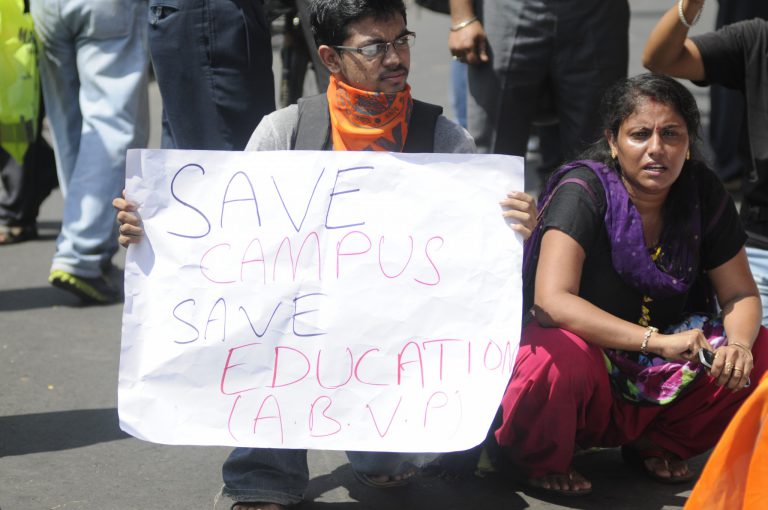
Academics in India have urged the central government not to sign a treaty at the forthcoming World Trade Organization meeting due to fears it will make higher education a “tradable service” that will cause tuition fees to rise to an unaffordable level.
India and 48 other World Trade Organization (WTO) countries, including Brazil and South Korea, offered to make Indian higher education a “tradable service” back in 2005, and academics claim they will now face pressure to apply it at the WTO’s 10th ministerial meeting in Nairobi, scheduled for the 15th-18th of this month.
Critics fear the Organization will turn India’s higher education sector into a business, encouraging foreign universities to take advantage of the market which will drive up the cost of tuition and result in a service that is largely inaccessible to the region’s prospective students.
https://t.co/59SqnoWfTd: Don’t Consumerise Higher Education: Stirring Students – The New Indian Express https://t.co/uG6SGtOJve #Education
— Education News India (@IndiaEduNews) November 30, 2015
The treaty discusses how all universities and colleges should be granted a level playing field, whether they are publicly or privately-funded, regardless of whether the institution is foreign or domestic.
The treaty also calls for the removal of government regulation on educational fees, as well as permission to distribute profits among shareholders – something which the region does not currently allow as higher education remains in the not-for-profit sector, forcing institutions to direct any profits towards their own expansion.
Academics say the 49 countries will be asked to sign the pact at the upcoming meeting.
One misstep at #WTO and Indian students could be priced out of their own colleges. #HigherEducation https://t.co/PetwF9iAoW
— The Telegraph (@ttindia) November 28, 2015
At a news conference called by the All India Forum for Right to Education, Madhu Prasad, a retired professor, said India must swiftly withdraw its 2005 offer, describing how, if the region goes ahead with the treaty, higher education will be strictly reserved for the elite.
“Foreign institutions (as also Indian private universities) will be eligible for the same subsidies that public-funded institutions now receive,” he said, describing how this would advocate “foreign institutions, irrespective of their standards, to offer education services by starting campuses or through other means”, and the lack of supervision will enable them to charge an extortionate amount in university fees.
Prasad claims the Indian government has already constricted funding to state-run institutions, and if the treaty goes ahead, they may cut subsidies further- or could even eliminate them completely- due to the fact it must provide equal benefits to both private and foreign universities.
“Once we [sign the pact], we give up equal opportunity for poor students. We will have to forget about social justice,” he said. “If education is bought and sold, then discrimination based on caste, religion and economic condition will continue to thrive.”
Indian higher education crisis: More Indians go abroad to study, and fewer international students come to India https://t.co/qCUqdYD9Xp
— Dheeraj Sanghi (@DheerajSanghi) November 25, 2015
Many are also concerned that the WTO agreement will force increasing numbers of students to enrol on professional courses in the hopes this will prepare them for success in the highest paying jobs.
“Hardly any student will prefer courses on the humanities or the liberal arts, which provide the foundational values of any society,” says Prabhat Patnaik, professor at the Jawaharlal Nehru University. “Making education a commodity is against the foundational values.”
Many fear the WTO regime will leave developing nations unable to match up the global higher education sector’s competitive juggernauts, opening the door for higher education across the globe to become increasingly exclusive.
Image via Shutterstock.
Liked this? Then you’ll love these…
Indian Student Enrolment in US Rises 30% to 130,000
Mass Student Exodus Means Crisis for Indian Higher Education







